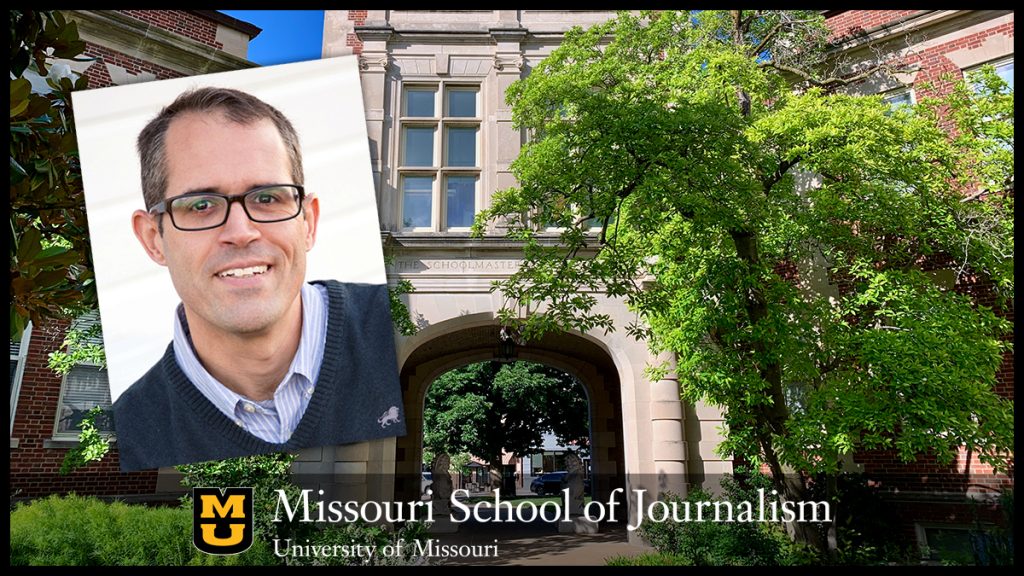Missouri School of Journalism welcomes Jared Schroeder

Schroeder’s research asks what journalism is made of in an era of machine learning, social media and debates about the limits of free speech
COLUMBIA, Mo. (Aug. 7, 2023) — The concept of free speech is vital to a free press, but it’s been subject to interpretation since the ratification of the First Amendment — and judges, not journalists, have the last word. That’s why Jared Schroeder believes understanding how courts define journalism and free speech in an era of technological innovation is a key part of the industry’s future.
As a tenured associate professor at the Missouri School of Journalism starting in August, Schroeder will bring his expertise to Mizzou through the lens of research into media law, free expression and emerging technology.
“In the classroom and in the research field, Jared’s work has powerful impacts,” said David Kurpius, dean of the School of Journalism. “He truly brings a 360-degree view to legal and technological issues that inform how journalists engage with their communities, making him a great addition to a School that prioritizes meaningful connections between news and the people it serves.”
There could hardly be a more fitting time for Schroeder’s arrival. Machine learning algorithms that write headlines and even news stories are spurring questions about whether free speech protections can apply to an algorithm; an increasingly volatile social media ecosystem is presenting challenges for journalists’ use of sites like X (formerly known as Twitter), Facebook and Instagram; and earlier this year, the Supreme Court heard cases that reflect the complex nature of free speech on — and by — digital platforms.
“I’m saying, ‘let’s break this down into its pieces and see which pieces make something journalism,’” Schroeder said. “When judges say, ‘you can’t limit this, it’s free expression,’ why are they saying that?”
Schroeder comes to Mizzou after eight years at Southern Methodist University (SMU), where he built a reputation as a cutting-edge researcher, theorist and teacher who brings the most pressing issues and conversations of the day into the classroom. In addition to numerous publications in peer-reviewed journals, he also frequently provides commentary in news media about first amendment issues and technology. He has authored two books and is currently finishing up a third.
At the School of Journalism, he hopes to expand the impact of his work with the resources and collaborative academic ecosystem the School offers — including by working with the Reynolds Journalism Institute (RJI), which uses applied research and experimentation to develop innovative solutions for newsrooms all over the country.
Going with the flow
Schroeder will be part of a group of researchers, including fellow new arrivals Joy Jenkins, Nick Mathews and Chau Tong, who will work with RJI to create practical impacts for newsrooms facing challenges in a rapidly evolving industry.
“Jared is working in fields that are so important to the future of journalism, and he’s already putting it to good use for RJI,” said Randy Picht, executive director of the institute, noting Schroeder’s co-authored articles about newsroom policies for AI usage and legal issues when news organizations use AI tools. “He has a strong handle on theory, but he also has the passion to pursue the kinds of knowledge and benefits that the industry can put to use right now.”
But fluidity and change are innate characteristics of issues surrounding media law, technology and free speech, and Schroeder said he is eager to approach his work at the School of Journalism with the expectation that something new — like the advent of sophisticated chatbots — could add further dimensions to his work.
That same openness characterizes his approach to teaching, an approach that fits neatly with the hands-on, experience-driven model of the School’s Missouri Method.
“I can walk in any day and be like, ‘hey, this happened yesterday,’ because my research area is a living, breathing thing,” Schroeder said. “You’re entering a conversation that has been going on for hundreds of years, and it’s not resolved. We continue to debate what free expression should look like because technology will change and society will change.”
And while he now approaches that conversation through the lens of academia, he is no stranger to a newsroom. During and after earning his first two degrees in Texas — a bachelor of science in journalism from Abilene Christian University in 2000 and a master’s in mass communication from Texas Tech University in 2006 — he worked first at the Abilene Reporter-News and then at the San Angelo Standard-Times, ultimately becoming the Times’ sports editor. He earned his doctorate in media law from the University of Oklahoma in 2013.
Though he enjoys being on the other side of the classroom, helping a new generation of scholars and journalists build foundations for successful careers, he will especially relish a new opportunity at the School of Journalism: teaching graduate students. At this well-accomplished stage of his career, a new teaching experience is one way that he can continue to push himself further.
“I don’t want to replicate myself as a scholar in some other poor soul, but I do want to pass on how I do what I do for someone who is going to be their own scholar,” Schroeder said. “Teaching grad students makes you grow because they ask difficult questions. That’s definitely something I didn’t want to go my whole career without doing.”
Updated: August 8, 2023